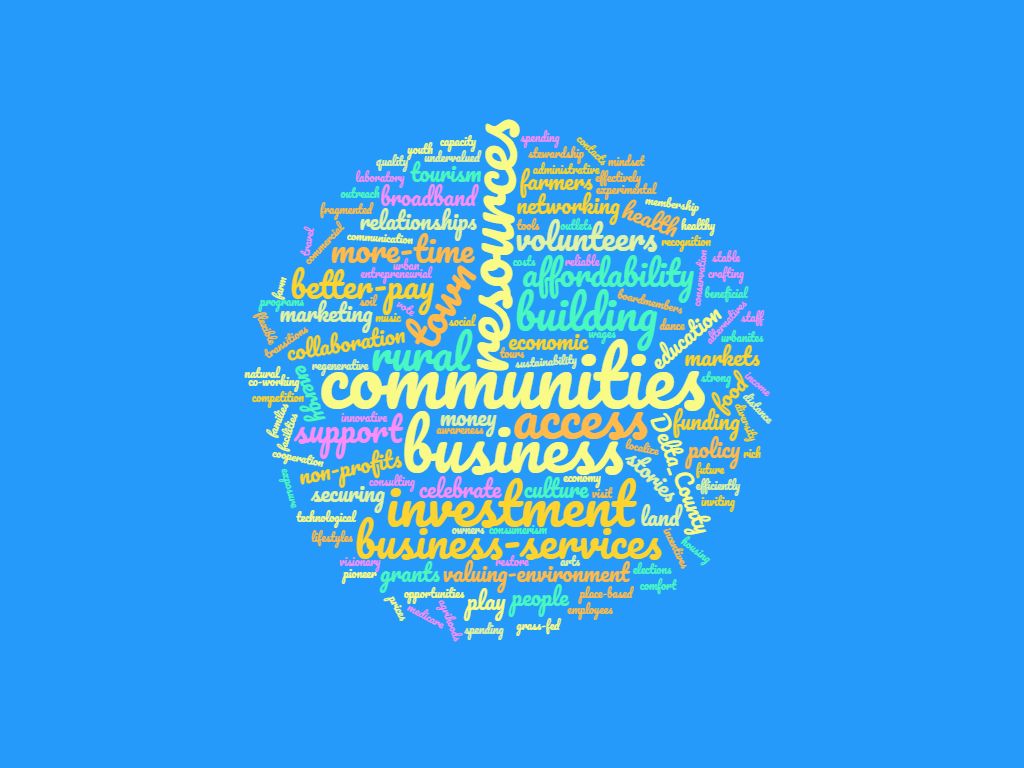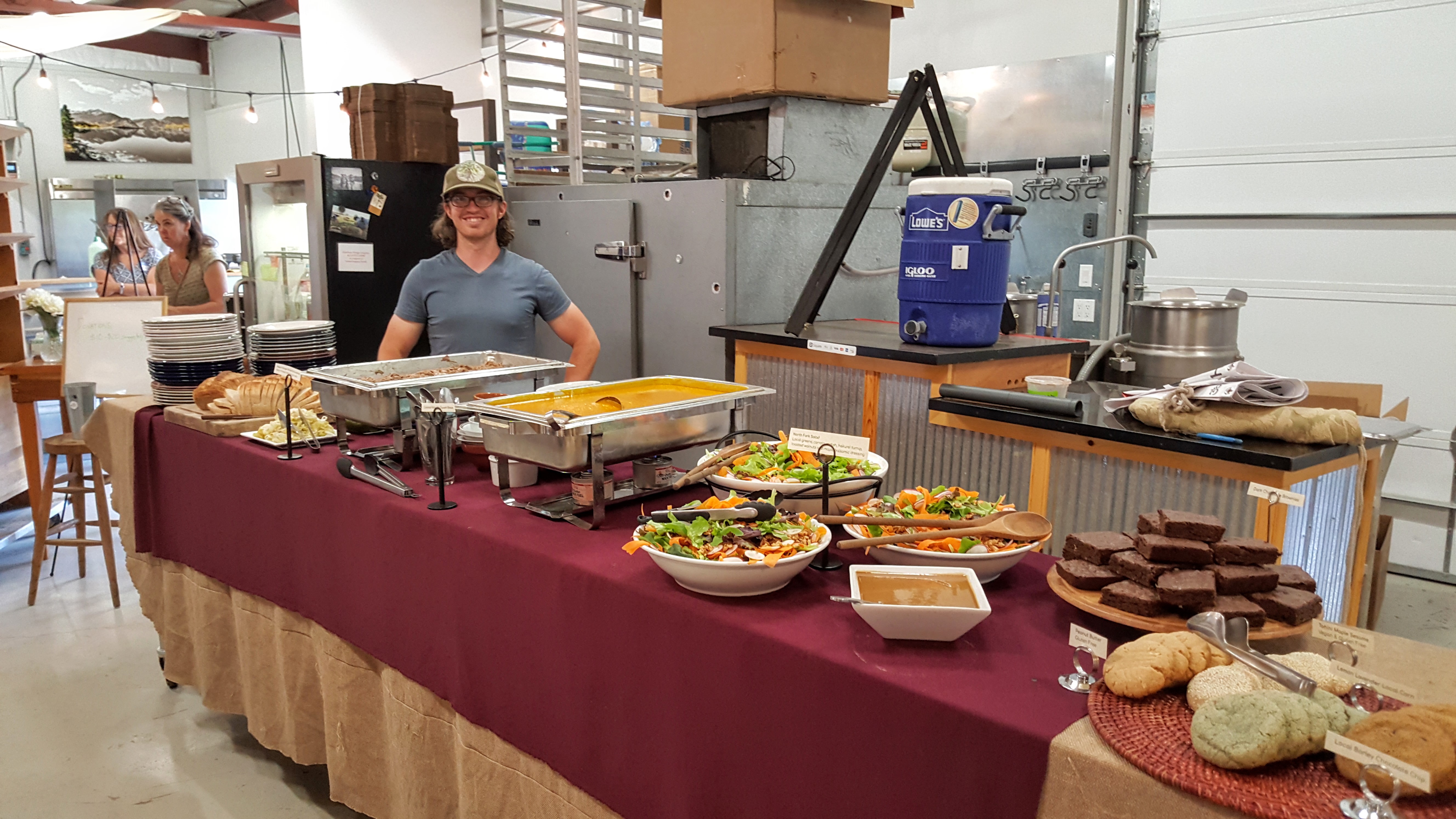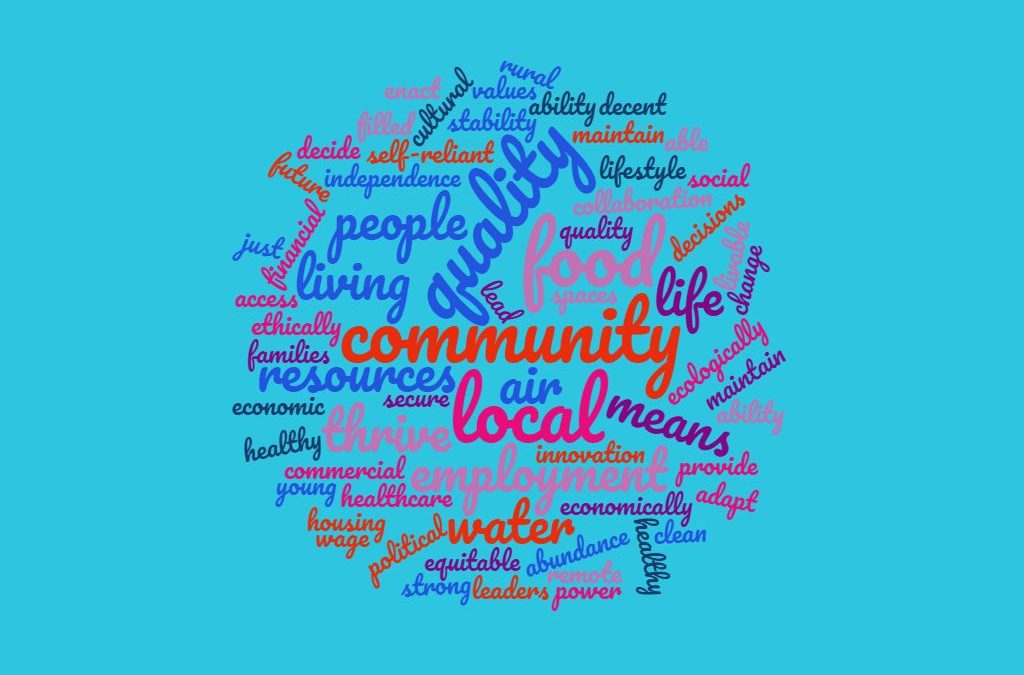Brainstorming Brunch – Rapid Prototyping Rural Prosperity
Too often when media get a story frame into their heads, it’s hard to shake. The so-called ‘rural divide’ that we often read about, is one such frame. It’s a cliche, now, the rural diner that some city reporter parachutes into for a long-form dive into what that mysterious “other” part of America is thinking. Road trips to rural America, for barbecue and going deep at the greasy spoon. Where truth comes along with the bottomless coffee cup, served up in homilies from this curious land so alike and yet so different than Capitol City.
And certainly there are differences between rural America and urban America, in wages and economic activity, in available services and opportunities, in education levels, resources and access, in politics and power. But as long as the narrative is framed as if ‘rural America’ and ‘urban America’ are two separate places, two separate populations, almost two separate nations–then that frame does not serve those who wish to help rural communities prosper alongside their urban counterparts.
Because we are a nation and population, spread out over a wide interdependent array and wonderful diversity of place. But the dynamics that impact rural America don’t end at the metropolitan statistical area line. And the benefits that urban America derives from rural regions shrinks when limited to only valuing them for the commodities, labor and resources that can be extracted.
So, instead of talking about the ‘rural divide,’ which just validates this limited (and limiting) frame: the Colorado Farm & Food Alliance, in our program to build stronger communities, talks about building for sustainability. Rural America doesn’t only need jobs, and so we work for ‘just sustenance,’ which we define as fostering economically secure, socially equitable, and ecologically resilient communities. Rural America deserves good jobs that people want, that provide local benefit and utility, and that contribute to greater society.
Participant Survey Word Cloud – What does Rural Prosperity look like?

Our Just Sustenance program recognizes that sustainable food systems rely on strong rural communities. Urban areas have a stake in healthy farms and clean water, and rural areas need secure economies, equitable opportunity, and a resilient framework with which to create their future. Rural America is diverse, resource-rich, and full of eclectic, creative and vibrant communities that can build for and determine their own futures. But their success requires a shared investment, just as their success promises a shared return.
The future of prosperous rural areas is not as resource colonies exporting raw product, nor are they waiting for urban thinkers and faraway policy-makers to solve their problems. Rural communities need to build secure, equitable, and resilient economies of place, and to be given the resources and power to shape that future themselves. As part of our work in this space, the Colorado Farm & Food Alliance recently initiated a ‘Brainstorming Brunch’ series in the North Fork Valley, a transitioning coal community in western Colorado and our home-base.
On June 14 we held our first session, dubbed the ‘Rural Prosperity Challenge.’ This event used a ‘rapid prototyping’ exercise to brainstorm actionable solutions to three challenge questions posed at the start of the activity. This first session had about 25 participants that included local government and economic development officials, nonprofit and foundation staff, business-owners, farmers, and other community leaders.
Like most Colorado Farm & Food Alliance activities, this one included great Colorado food, provided by Paonia-based Mountain Oven Bakery using many locally sourced ingredients. During lunch participants self-selected into three groups based on their interest in the individual challenge questions. The challenge questions were developed through two surveys that participants were asked to complete when they RSVP’d.
Mountain Oven Bakery & Catering provided an exceptional spread of local goodness.

Rapid prototyping is a version of “design-thinking” with roots in the tech industry. In this case we applied it to problem-solving social issues. The exercise itself is a facilitated set of directed time-limited activities that serve a process of idea generation, solution refinement, and testing. The mission is not to just gather good ideas, but to quickly move to focusing those ideas and honing them into specific, actionable solutions.
Below are the challenge questions, where each group started; and the solutions, where each group ended up. Participants then filled out an evaluation of the event and ranked their top two choices (of the three challenge/solutions). They are listed below in ranked choice order by most popular solution.
- Markets, Jobs & Wages – Most number of top votes & ranked choice winner
Challenge: Depressed regional wages, an overall lack of economic activity and return, including limited ways to add value to products, and sub-standard benefits including healthcare access and costs constrain local entrepreneurs, employers, and workers who seek to build better markets, attract more local economic activity, retain a qualified workforce, and support a culture that provides livable wages and quality-of-life for everyone.
Solution: Cooperative business-support entity or umbrella to secure collective or collaborative benefit, such as insurance pools, shared transportation and transit, valley-wide marketing, and business/entrepreneur/professional network.
- Professional Networking – Most number of second-place ranked votes
Challenge: Lack of peer support, professional and market isolation, the need to travel regularly (to Denver, etc.), limited opportunities for interaction with peers and for client outreach, and the lack of business services constrain new and established professionals seeking to enhance networks, and would benefit from greater peer-mentorship, business leads, and career opportunities.
Solution: Shared purpose and meta-mission-message, and cooperative space for local nonprofits, young professionals, and the self-employed – serving as a ‘chamber’ and ‘info center,’ ‘idea incubation hub,’ as well as co-working space, meeting space, and non-profit community-group space.
- Governments, Institutions & Policy – 2nd most number of top votes & third ranked choice
Challenge: County and government resistance or inertia, understaffed booster associations and ineffective community outreach, lack of cohesiveness among nonprofits, local governments, and businesses constrain residents, businesses, and organizations that seek to strengthen healthy institutions and local governments that are committed to local communities, responsive to changing economic needs, and are invested in building for a healthy future.
Solution: Leadership development to strengthen range of organizational and business leaders, board members, and elected officials – develop a community-based program to support current and emerging leaders in their advancement; and to recruit and cultivate new leaders, to share in skills-building, and to support innovative thinking and risk-taking.
While the first event was a success – in that each group was able to narrow down a broad challenge into a specific solution, the final success will be in how each of the solutions manifest. To that end the conversations started on June 14 are continuing, and we hope to share more updates soon. In the future we also plan on holding two more similar events, looking at slightly different issues that challenge rural communities.
The Colorado Farm & Food Alliance networks family farms, winemakers, brewers, food producers, chefs and restaurateurs to cultivate and strengthen the local food movement, to support sustainable rural communities, and to provide a platform for effective climate and conservation advocacy. Our work is covered by three program areas.
- Farm and Food Allies: Strengthening the Local Food Movement to Build Farm and Food Leaders.
- Just Sustenance: Building Resilient, Fair, and Secure Communities that can Protect Sustainable Food System.
- Conservation Advocacy and Climate Action: Defending Healthy Lands, Clean Water and Stable Climate to Protect our Farms, Food and Drink.
Just Sustenance: Building Resilient, Fair, and Secure Communities that Protect Sustainable Food Systems.
The Colorado Farm & Food Alliance seeks to create more secure, equitable, and resilient agriculture and food systems, by supporting local communities working to implement more sustainable agricultural practices and develop more clean energy solutions, and in support of a just economic transition to a future of shared abundance that benefits all Coloradans.

